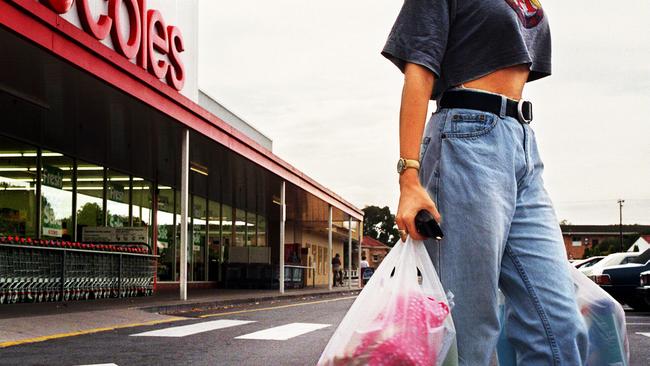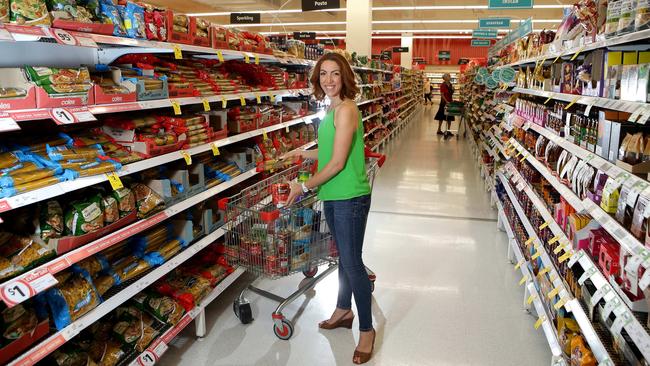Shoppers opt for less meat, cheaper brands as household budgets crunched: Coles research
Shoppers are cutting back on dining out, switching to cheaper brands and relying on discounts and loyalty points as household budgets come under increasing strain, a new Coles survey reveals.

Business
Don't miss out on the headlines from Business. Followed categories will be added to My News.
The cost-of-living crisis haunting consumers as they walk up and down the supermarket aisle is worsening, with three-quarters of shoppers cutting back on eating out, one-third eating less meat and more than half relying on loyalty points and promotions to feed their families and stretch household budgets.
A recent survey of shoppers by supermarket giant Coles, and obtained by The Australian, paints a highly pessimistic picture of the Australian consumer in the weeks after Christmas festivities when people are struggling to fill their pantries at home and resorting to cut backs and efficiencies elsewhere in their weekly budgets to make ends meet.
Internal Coles research has shown that consumer sentiment remains incredibly pessimistic with cost-of-living pressures remaining top of mind over January as they entered a supermarket for their food and groceries.
The Coles survey revealed that 67 per cent of shoppers are cutting back on eating out, 58 per cent are buying more groceries on discounts and promotions, 46 per cent are switching to cheaper brands and just over half are relying on loyalty points and rewards offers to save money at the checkout.
The survey of shoppers conducted by Coles over January also reported that 33 per cent were eating less meat, a sure sign that consumers were switching from expensive proteins and to more affordable protein-heavy foods such as eggs.
Looking to save money wherever they could, delivering more funds for food and groceries, 38 per cent said they were cutting back on media subscriptions such as streaming services Netflix, Spotify and mobile phone apps.

And as shoppers were heading out to restaurants less to save money, with 52 per cent making more home-cooked meals, one-third of those surveyed by Coles said they taking care of beauty and grooming needs at home instead of going out and 24 per cent were prioritising kids and pets as they put together their family budgets.
One-third of shoppers also said they were cooking in large batches to freeze and then later feed their families through the week or month.
Both supermarket chains, Coles and Woolworths have picked up on the cost-of-living crisis impact their shoppers in terms of what they buy and the volumes they put in their trolleys, and especially the trend to lower-priced goods such as private label groceries and a shift from expensive red meat to chicken or in some cases consumers giving up meat completely.
“We know that the current cost-of-living environment is tough for Australians, particularly as increasing household costs make it more difficult to balance the household budget,” Coles chief executive Leah Weckert told Coles shareholders at its annual general meeting in November.
“I am acutely aware of the pressure on Australian families as a result of cost-of-living increases and delivering meaningful value is our key priority,” Woolworths boss Amanda Bardwell said in her speech to shareholders at its most recent AGM.
But the latest internal data from Coles points to a worsening household budget crisis for the average Australian as they resort to cancelling Netflix, stopping purchasing red meat or relying more on rewards points to feed themselves and their families.
“Coles is working hard to take the pressure off at the checkout for households and families,” a Coles spokesman told The Australian.
“As cost of living remains a challenge for so many of our customers, we are focused on helping them find value in our stores through weekly specials, value campaigns, Flybuys and exclusive brands.
“Last month, we reduced the price of 230 products including essentials and summer items, in addition to our weekly specials. Customers tell us they are cooking more at home, shopping the specials, and using their loyalty points and offers to save and balance the household budget, particularly as expenses like mortgages, rents, electricity, fuel and insurance also add to the cost of living.”
The cost-of-living crisis is likely to be a top issue for the upcoming federal election as politicians on both sides of the aisle look to offer extra benefits to households while some also look to deflect the blame to others.
In November Coles chairman James Graham uncharacteristically lashed out at Canberra for “politicising” the cost-of-living crisis to attack supermarkets when only a few years ago through the Covid-19 pandemic and lockdowns the sector was seen as a “hero” for keeping the nation fed.
“(Coles) was well aware of the economic pressures on customers, and we continually seek to find ways to respond and build customer trust,” Mr Graham told shareholders.
“In this context, it has been disappointing to see how cost-of-living issues have been politicised and targeted at supermarket operations. This is in sharp contrast to the level of engagement and support of supermarkets by governments and regulators during the Covid lockdown years.”
Originally published as Shoppers opt for less meat, cheaper brands as household budgets crunched: Coles research



